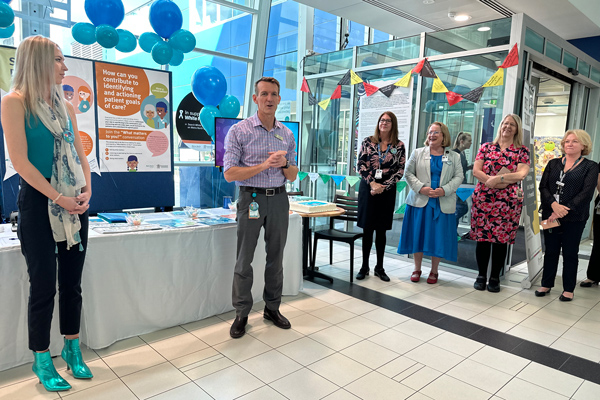
Mark Cruickshank, A/Executive Director Allied Health Professions and executive sponsor for Patient Goals of Care initiative at the launch event.
On Monday 18 September, RBWH launched the initiative What Matters to You. Originally starting in Scotland, this initiative has spread all over the globe and encourages health workers to take the time to ask their patients about their personal goals of care.
For Associate Professor Zarnie Lwin, Senior Medical Oncologist, learning about her patients’ lives outside of the walls of the hospital has been a large part of her approach to delivering care, as well as the topic of a study she was involved with at the University of Sydney.
“When the patients realise you are doing research about their lens and what they are going through, there’s lots of enthusiasm because they feel like you are listening,” Zarnie said.
As part of a project called ‘The Changing Landscapes of Survivorship’, Zarnie equipped cancer patients with digital cameras, tasking them with taking photos to reveal what living with cancer looked like in their day-to-day lives.
“This type of research is more about the human aspects of delivering care,” Zarnie said, “for example, it’s not going to change the drugs we are giving patients or the types of scans we request — that’s the science and we need to stick to that.”
“However, these are little things that can make a patient and their carer feel very much acknowledged and appreciated. It’s another piece in the puzzle of being a good clinician all round.”
Incorporating patient goals of care requires learning about what’s important in the patients’ lives.
“Instead of always mentioning blood results, being able to ask if they were able to sing in their choir, mop the floor or pick up their grandchildren, and see them as a person, that goes a long way in building their strength and trust in you as a clinician,” Zarnie said.
“If a patient can share their little and big achievements with you, that creates a very good clinical atmosphere and a good foundation for trust, which then helps confronting and getting through difficult challenges and obstacles together.”
For most health workers, finding time to have conversations about patients’ lives is not always easy. During a three-to-four-hour clinic, Zarnie will often see between 20 to 25 patients and sometimes up to 30 patients.
However, Zarnie recognises that through her academic work into patients’ lived experiences and through patients’ diaries, which are often used for those who undertake clinical trials, she has become a better clinician.
“It adds to my professionalism,” Zarnie said, “we are better clinicians if we can see our patients as the people they are in society.”
“It’s about the patient’s experience as well as the clinician’s experience, which is very underrated. A patient that can say ‘I trust my oncologist; she shows interest in me and knows what makes me tick’ — you can’t really measure this.”
The photos taken by patients as part of the research project were accompanied with captions and displayed publicly for three weeks in the common walkways of the hospital. The photos can be viewed on the Picturing Cancer Survivorship website.
To learn more about the What Matters to You initiative, visit QHEPS or contact RBWH_SIS@health.qld.gov.au to sign up to be a champion or request an in-service for your team.